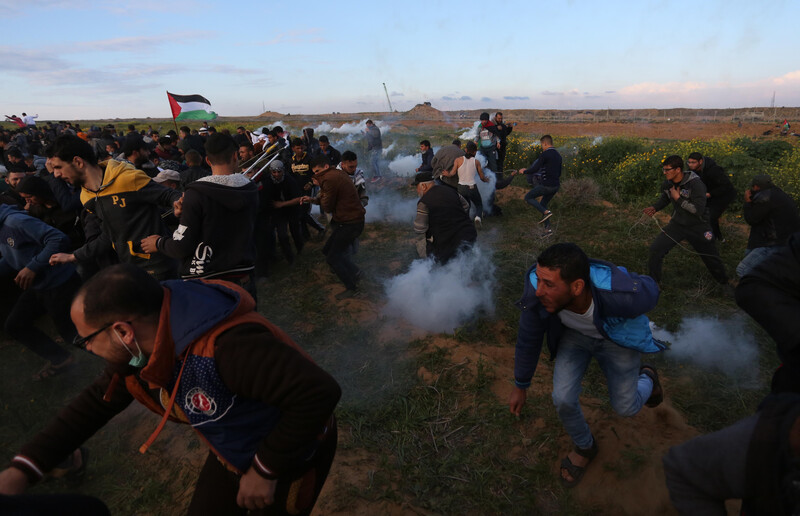Rights and Accountability 23 February 2019

Palestinians protest during a Great March of Return demonstration east of Khan Younis, southern Gaza, on 22 February.
APA imagesIsraeli occupation forces shot and killed a 14-year-old Palestinian boy in Gaza as protesters met with lethal force for the 48th consecutive Friday of demonstrations held under the banner of the Great March of Return.
Yusif Said Hussein al-Dayeh died after he was shot in the chest east of Gaza City, according to the human rights group Al Mezan, which says that 190 Palestinians have been killed during the protests since their launch on 30 March last year.
Forty of those killed were children.Israeli forces have killed seven Palestinian children in the West Bank and Gaza Strip so far this year, nearly half the total of 17 fatalities in 2019.
Targeted with tear gas canisters
Three Palestinians – including two children – have been killed this year after being directly hit by tear gas canisters fired by Israeli soldiers during Gaza protests.
Al Mezan stated that occupation forces continued to target protesters with tear gas canisters during Friday’s protest, hitting 50 people directly.
Freelance photojournalist Munib Samir Ahmed Abu Hatab, 23, was hit by a tear gas canister in the stomach.
For several weeks, protest tactics were more subdued, with decreased attempts to cross the Israel-Gaza boundary fence, and a halting of the burning of tires, stone-throwing and the launching of incendiary balloons. Palestinians still faced deadly violence by Israeli occupation forces during the quieter protests.
More confrontational tactics have picked up again – with balloons landing in southern Israel once again and “night confusion units” burning tires and making loud noises “to sow fear among Israeli soldiers and civilians nearby,” as one Israeli paper put it – as pressures mount on the two million Palestinians living in besieged Gaza.
“Risk of war looms large”
Nickolay Mladenov, the United Nations Middle East peace envoy, warned the Security Council this week that “Extremists are on the rise again and the risk of war continues to loom large,” seemingly referring to the Israeli premier’s backing of far-right genocidal parties and preparations for another massive military offensive in Gaza.
“Our efforts today are focused on the immediate challenges – on preventing the risk of an economic and humanitarian implosion in the West Bank and Gaza,” Mladenov stated.
Palestinians celebrated on Friday after entering a gate at the al-Aqsa mosque compound in Jerusalem that has been sealed by Israel since 2003.
Bab al-Rahma gate has been the site of protest over the past several days.
Israeli forces arrested 60 Palestinians in their East Jerusalem homes on Thursday night “on suspicions of incitement and rioting ahead of the Friday prayers,” the Israeli newspaper Haaretz reported.
Israel claimed that an Islamic association that operated out of the building was affiliated with Hamas when it ordered the closure 16 years ago.
Last week, Jordan, which controls the Islamic trust that administers the holy site, expanded the council from 11 to 18 members, adding for the first time local Palestinian leaders. The extraordinary move is seen as an attempt to prevent any change to the status quo at al-Aqsa, where right-wing Israelis enter increasingly under heavy police escort.
Video shows the opening of the gate and hundreds of worshippers streaming into the building while chanting “God is great” on Friday:
Meanwhile, in the occupied West Bank city of Hebron, Palestinians protested ahead of next week’s anniversary of the Ibrahimi mosque massacre: The mosque was partitioned by Israel following the massacre of 29 Palestinian worshippers by an American Jewish settler at the site in 1994.The gunman, Baruch Goldstein, was a follower of virulently anti-Arab Rabbi Meir Kahane, whose far-right movement is being courted by Prime Minister Benjamin Netanyahu as he seeks to build a coalition that can win a majority in Israel’s parliament, the Knesset, at the polls in early April.
Kahane was assassinated in 1990 and the political parties associated with him – Kach and Kahane Chai – were so violent and racist that even Israel officially banned them as terrorist groups in 1994.Netanyahu is now welcoming their most ardent followers into Israel’s political mainstream.





